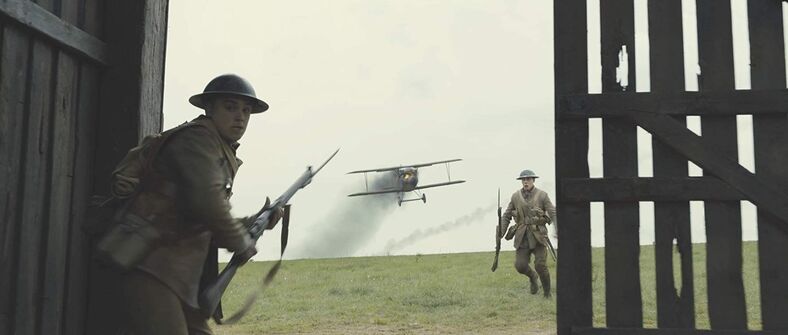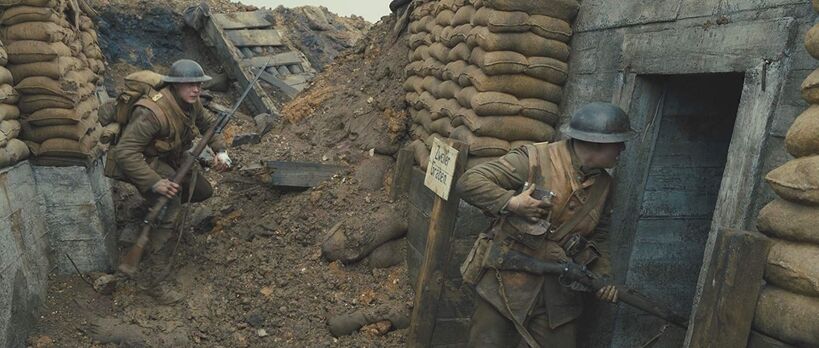1917
****
Director: Sam Mendes
Screenwriters: Sam Mendes and Krysty Wilson-Cairns
Principal cast:
George MacKay
Dean-Charles Chapman
Mark Strong
Colin Firth
Benedict Cumberbatch
Adrian Scarborough
Country: UK/USA
Classification: MA15+
Runtime: 119mins.
Australian release date: 9 January 2020
Previewed at: Event Cinemas, George Street, Sydney, on 17 December 2019.
“The first time I understood the idea of war was when my grandfather told me about his experiences in the First World War. This film is not a story about my grandfather, but rather the spirit of him - what these men went through, the sacrifices, the sense of believing in something greater than themselves,” says Sam Mendes, talking about his Golden Globe-winning film (Best Drama and Best Director), 1917. The director of Bond films Spectre and Skyfall and, more recently, the National Theatre Live production of The Lehman Trilogy, remembered his grandad’s stories when looking for a more human project after the two massive James Bond movies. 1917 is just as epic in scale as those titles but is a much more personal tale.
Unfolding on just one day, April 6th, of that eponymous year, the film follows two Lance Corporals, Blake (Dean-Charles Chapman) and Schofield (George MacKay), as they weave their way across no-man’s land between the British and German frontlines. Their death-defying mission is to inform a battalion of 1600 men that they are about to walk into an elaborate trap laid for them as the German army retreated to the Hindenburg Line, and one of those doomed troops is Blake’s Lieutenant brother (Richard Madden). To cap it all off, the crossing must be made in daylight because the British have been unable to surveil the area closely, although they suspect that there will be plenty of snipers, land mines, trip wires and booby-traps. If the lads fail, the subsequent losses will be devastating. So, no pressure then.
From the moment of its conception, Mendes envisaged that viewers of 1917 should be virtually riding on the shoulders of the young soldiers as they dodged and dashed though the trenches, tunnels and ruins of no man’s land on their Homerian quest. He wanted us to really experience how it must have felt for the troops. Thus, he employed the skills of veteran cinematographer Roger Deakins to shoot the film in long takes, some lasting almost 10 minutes, and he and Deakins would choreograph them in such a precise way that the minimal editing (by Lee Smith) would appear seamless. The film is not, as some have suggested, one continuous take, but that does not to diminish in any way the awesome skill on display. Mendes explained, “I wanted to travel every step and breathe every breath with these boys, and cinematographer Roger Deakins and I discussed shooting 1917 in the most immersive way. We designed it to bring audiences as close as possible to their experience. It’s been the most exciting job of my career.”
MacKay and Chapman are thoroughly believable in their roles, exhibiting a combination of emotions that run the gamut from fear to foolhardiness to extraordinary bravery and back again. Mendes deliberately cast relative newcomers because he wanted actors who wouldn’t carry with them an audience’s pre-conceived notions about them. Although there are many well-known faces in the supporting parts, the film is really focussed on MacKay and Chapman and they have proved themselves to be up to the task. As 1917 progresses, their characters are stripped down to their bare elements, in much the same way as they lose much of their gear as they venture deeper into enemy territory, until the raw, unadorned man is on display. Both performances are harrowingly effective.
If 1917 has a fault, it’s that one can’t help asking whether, with so many lives at stake, the British Army would have charged just two men with such a vital task. Surely they would have employed more forces to ensure that word got through to the threatened battalion? Relying on just two individuals is playing against the odds. This slight question mark doesn’t stop the film from being completely absorbing, however, and you still find yourself immersed in the fate of the Lance Corporals. As in Apocalypse Now, Blake and Schofield’s journey into the heart of darkness gets crazier and crazier as it approaches its final destination. 1917 is up there with the best of the spate of films we’ve seen in recent years about the sacrifices made by ordinary young men during the Great War, like Journey’s End and They Shall Not Grow Old. It's a stunning achievement.
Screenwriters: Sam Mendes and Krysty Wilson-Cairns
Principal cast:
George MacKay
Dean-Charles Chapman
Mark Strong
Colin Firth
Benedict Cumberbatch
Adrian Scarborough
Country: UK/USA
Classification: MA15+
Runtime: 119mins.
Australian release date: 9 January 2020
Previewed at: Event Cinemas, George Street, Sydney, on 17 December 2019.
“The first time I understood the idea of war was when my grandfather told me about his experiences in the First World War. This film is not a story about my grandfather, but rather the spirit of him - what these men went through, the sacrifices, the sense of believing in something greater than themselves,” says Sam Mendes, talking about his Golden Globe-winning film (Best Drama and Best Director), 1917. The director of Bond films Spectre and Skyfall and, more recently, the National Theatre Live production of The Lehman Trilogy, remembered his grandad’s stories when looking for a more human project after the two massive James Bond movies. 1917 is just as epic in scale as those titles but is a much more personal tale.
Unfolding on just one day, April 6th, of that eponymous year, the film follows two Lance Corporals, Blake (Dean-Charles Chapman) and Schofield (George MacKay), as they weave their way across no-man’s land between the British and German frontlines. Their death-defying mission is to inform a battalion of 1600 men that they are about to walk into an elaborate trap laid for them as the German army retreated to the Hindenburg Line, and one of those doomed troops is Blake’s Lieutenant brother (Richard Madden). To cap it all off, the crossing must be made in daylight because the British have been unable to surveil the area closely, although they suspect that there will be plenty of snipers, land mines, trip wires and booby-traps. If the lads fail, the subsequent losses will be devastating. So, no pressure then.
From the moment of its conception, Mendes envisaged that viewers of 1917 should be virtually riding on the shoulders of the young soldiers as they dodged and dashed though the trenches, tunnels and ruins of no man’s land on their Homerian quest. He wanted us to really experience how it must have felt for the troops. Thus, he employed the skills of veteran cinematographer Roger Deakins to shoot the film in long takes, some lasting almost 10 minutes, and he and Deakins would choreograph them in such a precise way that the minimal editing (by Lee Smith) would appear seamless. The film is not, as some have suggested, one continuous take, but that does not to diminish in any way the awesome skill on display. Mendes explained, “I wanted to travel every step and breathe every breath with these boys, and cinematographer Roger Deakins and I discussed shooting 1917 in the most immersive way. We designed it to bring audiences as close as possible to their experience. It’s been the most exciting job of my career.”
MacKay and Chapman are thoroughly believable in their roles, exhibiting a combination of emotions that run the gamut from fear to foolhardiness to extraordinary bravery and back again. Mendes deliberately cast relative newcomers because he wanted actors who wouldn’t carry with them an audience’s pre-conceived notions about them. Although there are many well-known faces in the supporting parts, the film is really focussed on MacKay and Chapman and they have proved themselves to be up to the task. As 1917 progresses, their characters are stripped down to their bare elements, in much the same way as they lose much of their gear as they venture deeper into enemy territory, until the raw, unadorned man is on display. Both performances are harrowingly effective.
If 1917 has a fault, it’s that one can’t help asking whether, with so many lives at stake, the British Army would have charged just two men with such a vital task. Surely they would have employed more forces to ensure that word got through to the threatened battalion? Relying on just two individuals is playing against the odds. This slight question mark doesn’t stop the film from being completely absorbing, however, and you still find yourself immersed in the fate of the Lance Corporals. As in Apocalypse Now, Blake and Schofield’s journey into the heart of darkness gets crazier and crazier as it approaches its final destination. 1917 is up there with the best of the spate of films we’ve seen in recent years about the sacrifices made by ordinary young men during the Great War, like Journey’s End and They Shall Not Grow Old. It's a stunning achievement.

